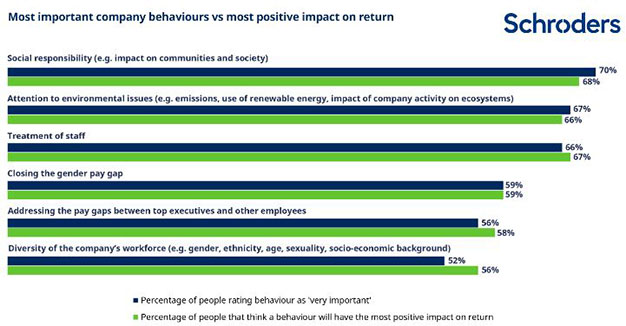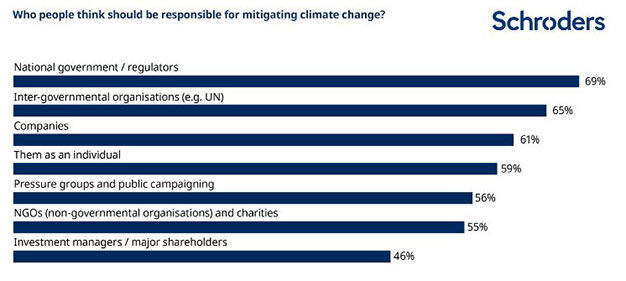Schroders: Agents of sustainable change; How investors expect companies to be socially aware
Schroders’ Global Investor Study 2020 reveals investors’ views on how companies behave and who should be responsible for mitigating climate change.

Companies’ wider social impact is the sustainability issue investors care about most according to the latest Schroders Global Investor Study. The landmark annual survey of more than 23,000 investors from around the world asked respondents for their views on sustainable investing. Conducted across 32 locations worldwide between 30 April and 15 June 2020, the study suggests 70% consider social factors of key importance. This is closely followed by environmental issues (67%) and treatment of staff (66%).
The “new social contract”: these are the behaviours investors care about most
This year’s respondents are likely to have had the impact of Covid-19 and restrictions on their local communities front of mind. In the months after the World Health Organisation declared Covid-19 a pandemic, it was widely recognised that a sustainable recovery was needed.
In the wake of the virus, there have been rising calls for governments and businesses to be part of a “new social contract”, something Schroders’ CEO has spoken out about. This has coincided with the 20th anniversary of the United Nations Global Compact, the world’s largest corporate sustainability initiative. Interestingly, the behaviours people deemed to be the most important from a sustainability perspective are also considered the most impactful on returns.
Figure 1: Most important company behaviours vs most positive impact on return

Who do people think should be responsible for mitigating climate change?
Questions have been asked about what Covid-19 could teach us about tackling climate change.
Schroders’ Climate Progress Dashboard suggests the current pace of change will result in temperatures rising by 3.9°C above pre-industrial levels - almost twice the Paris Agreement target.
When it comes to who people think should be responsible for mitigating climate change overall, nearly half (46%) said investment managers or major shareholders have a role. Schroders’ study found that 69% think national governments and regulators are responsible for mitigating climate change, while more than half (59%) see this issue as something individuals should take responsibility for as well.
Some 61% of those surveyed hold companies themselves accountable – almost as many as the two-thirds who pointed to governments and inter-governmental organisations. Hannah Simons, Head of Sustainability Strategy at Schroders, says: “It is clear from the responses that a number of different groups have a part to play. This highlights the need for engagement and collaboration. Collective action is needed.”
Figure 2: Who should be responsible for mitigating climate change?

What should investment managers do with investments in companies involved in fossil fuels?
Although less than half of people consider investment managers responsible for mitigating climate change, 58% of people think they should withdraw funds from the fossil fuel industry.
Just over a third (36%) said managers should withdraw investment from companies involved in the fossil fuels industry to limit their ability to grow. However, over a quarter (27%) said managers should remain invested to drive change and 14% said they should stay invested as long as it is profitable. The remaining 22% said investment managers should withdraw investments from these firms on moral grounds.
Figure 3: What should companies do about those involved in the fossil fuel industry?

The findings suggest that while investment professionals are not explicitly blamed for carbon emissions levels, they are expected to become more involved in reducing them. The difference in opinion on the fossil fuel industry is a reminder that there are differing interpretations of what it means to make responsible and sustainable investment decisions.
Hannah Simons says: “Sustainable investing means different things to different people. It is important for people to understand the credentials of their investments to ensure their portfolio aligns with their own values.
“As we seek to deliver not only returns for investors, but better outcomes for society as a whole, measurement and tracking of progress remain critical. The tools that we have developed and the analysis we undertake put a financial value on the impacts that companies have on society – which are increasingly being identified as financial costs. At Schroders we are committed to integrating sustainability across everything we do. It is clear that the financial sector plays a key role in tackling climate change, and we believe this requires a forward-looking, active approach.”
Schroders commissioned Raconteur to conduct an independent online study of 23,450 people in 32 locations around the world between 30 April and 15 June 2020. This research defines “people” as those who will be investing at least €10,000 (or the equivalent) in the next 12 months and who have made changes to their investments within the last 10 years.
Important Information
This communication is marketing material. The views and opinions contained herein are those of the author(s) on this page, and may not necessarily represent views expressed or reflected in other Schroders communications, strategies or funds. This material is intended to be for information purposes only and is not intended as promotional material in any respect. The material is not intended as an offer or solicitation for the purchase or sale of any financial instrument. It is not intended to provide and should not be relied on for accounting, legal or tax advice, or investment recommendations. Reliance should not be placed on the views and information in this document when taking individual investment and/or strategic decisions. Past performance is not a reliable indicator of future results. The value of an investment can go down as well as up and is not guaranteed. All investments involve risks including the risk of possible loss of principal. Information herein is believed to be reliable but Schroders does not warrant its completeness or accuracy. Some information quoted was obtained from external sources we consider to be reliable. No responsibility can be accepted for errors of fact obtained from third parties.
Schroders, October 2020
Important notes
Please note that these are the views of Vicki Owen of Schroders and should not be interpreted as the views of RL360.